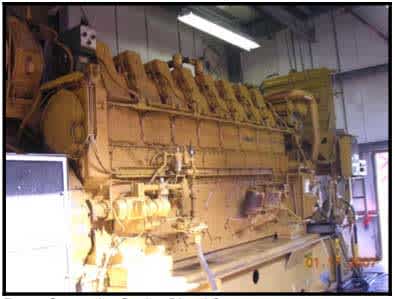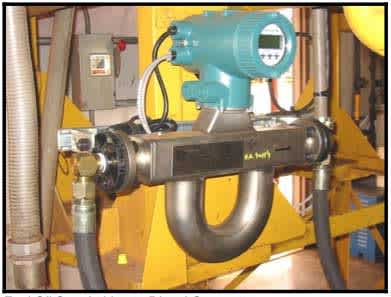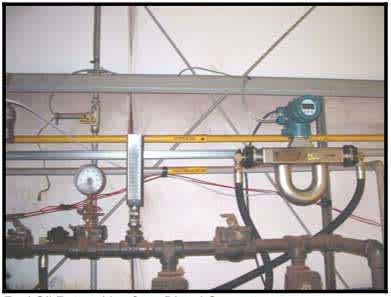Introduction
 |
| Power Generation Station Diesel Generator |
Flow Measurement of diesel fuel is a relatively basic flow meter application. However, measuring net fuel consumption on a 2.2 megawatt diesel generator is uniquely complex. The diesel engine requires a supply fuel line (fuel from the tank to the engine) and a return fuel line (fuel from the engine back to the tank). The net fuel consumed is the difference between the fuel supply and the fuel return, a measurement which requires two flowmeters.
In order to achieve the high fuel pressure required at the nozzle for atomization, but still maintain tight control of the fuel flow rate, a supply/return method is used. This method is not limited to diesel engines. In fact, nearly any type of burner using a liquid fuel will have this supply/return method, for example, black liquor recovery boilers in paper mills and other boilers burning liquid fuels.
Application
In diesel powered generators the supply and return flow rates are usually measured by a positive displacement type flowmeter providing a pulse output. The resulting volumetric measurement works, but one of the main problems with the application is that the supply fuel and return fuel normally operate at significantly different temperatures. The supply fuel is at approximately 90°F and the return fuel 120°F or higher. Significant fluctuations in operating temperature and the large temperature difference between the supply and return fuel cause a significant difference in fuel density at each measurement point. Volumetric flowmeters are unable to compensate for this difference, thus generating an unacceptable error in the measurement.
One generating plant is trying to improve their operating efficiency and reduce overall emissions by using fuel additives. The errors and inconsistencies of the volumetric fuel flow measurement made it impossible to determine if the additive was having any effect on the generator's performance, so they chose the RotaMASS Coriolis mass flowmeter for it's accuracy and to eliminate measurement errors due to density changes.
Solution
 |
| Fuel Oil Supply Line to Diesel Generator |
Two RotaMASS meters were installed, one on the fuel supply line and one on the fuel return line. The return line meter was mounted on the building wall near the fuel tank, but for convenience the supply unit was mounted on an engine accessory rack next to the diesel engine. During operation there is vibration from the diesel engine, but RotaMASS' "box-in-box" design eliminated any issues resulting from these vibrations.
The RotaMASS' multiple outputs were also very useful. The most important measurement was the net fuel measurement, so the RotaMASS had to interface with an existing flow computer that accepted only a pulse input. The flow computer monitored the two flows, calculated net flow, and output the resulting 4-20 mA analog signal to the existing emissions monitoring system.
Since it was impossible to change any of the emissions monitoring scaling, it was important that the RotaMASS pulse output be scaled to duplicate the pulse output of the volumetric flowmeters that the RotaMASS replaced.
RotaMASS effectively replaced the old volumetric meter for net flow for emissions monitoring, but the capabilities of RotaMASS were not fully exploited. The customer had more ideas to fully take advantage of the RotaMASS. They chose to collect both mass flow rate and volumetric flow rate. Supply and return values for these parameters are being trended on the MV200. The MV200 calculation capability is used to generate fuel consumption values for Mass Flow and Volumetric Flow that can then be compared.
The Yokogawa MV200 DAQ Station is an electronic data acquisition system that displays real-time data on a color LCD while saving this data to removable media. This data is accessed and downloaded via LAN connection to a remote work station.
The DAQstation was configured to display and capture the following data
- Volumetric Supply Flow Rate
- Volumetric Return Flow Rate
- Net Flow (Calculated by the DAQstation internal math channel)
- Kilowatt Hrs
- Frequency
- Power Factor
- Supply Mass Flow Rate
- Return Mass Flow Rate
 |
| Fuel Oil Return Line to Diesel Generator |
Since the customer has historical data in GPM, it was desirable to convert the mass flow outputs to GPM. This can be done in the RotaMASS by selecting the volumetric flow rate output, but old data was based on a fixed density.
Volumetric flow rate can be matched to the historical data by setting the density in the RotaMASS to a fixed value. Then the volumetric output is scaled so that each gallon weighs the same amount. This is very similar to the way the API computes standard gallons or API temperature corrected volumetric flow measurements.
The supply and return meters were scaled in the DAQstation using a fixed density of 6.78 lb/gal. The 5000 lb/hr was divided by 6.78 lb/gal, then divided by 60 min/hr to set the scaling at 12.29 GPM full scale. The RotaMASS meters were later rescaled to 4881.6 lb/hr to make the scale in the DAQstation easier to read with a GPM span of 12.00 GPM.
With all the measurements being made by the RotaMASS meters and the calculations and data collection being done by the MV200 DAQstation all that's left to do is wait for the data and analyze the results from the additive additions project.
Industries
-
Drilling
Onshore unconventional drilling is commonly used in the extraction of oil and natural gas today. There are an increasing number of multi-well pad type drilling programs in most of the active plays. Different drilling technics are used to decrease drilling time, lower environmental impact and to improve initial and estimated ultimate recovery.
-
Floating Production Storage & Offloading (FPSO)
- Floating Production, Storage, and Offloading (FPSO) unit
- Offshore production facility
- Stores processing equipment, produced hydrocarbons storage
- Feasible to produce oil in remote areas, deeper water
-
Onshore
The onshore upstream industry faces ever higher demands and greater challenges with increasingly difficult and hostile environments in which it must operate.
-
Power
In the mid 1970s, Yokogawa entered the power business with the release of the EBS Electric Control System. Since then, Yokogawa has steadfastly continued with the development of our technologies and capabilities for providing the best services and solutions to our customers worldwide.
Yokogawa has operated the global power solutions network to play a more active role in the dynamic global power market. This has allowed closer teamwork within Yokogawa, bringing together our global resources and industry know-how. Yokogawa's power industry experts work together to bring each customer the solution that best suits their sophisticated requirements.
-
Processing & Fractionation
- Natural-gas processing
- Control dew point of natural gas stream
- Separate natural gas liquids for sale and distribution
-
Topsides
- Topsides processing and handling on the production platform prep extracted hydrocarbons for transport
- Yokogawa integrated control/monitoring maximize topsides operations productivity and availability
Related Products & Solutions
-
MV100/MV200
Model: MV102, MV104, MV106, MV112, MV204, MV208, MV210, MV220, MV230
-
ROTAMASS 3
- ROTAMASS Coriolis Mass Flow Meter, integral and remote type
- Highly refined digital signal processing electronics for accurate, stable mass flow measurement
Have Questions?
Contact a Yokogawa Expert to learn how we can help you solve your challenges.